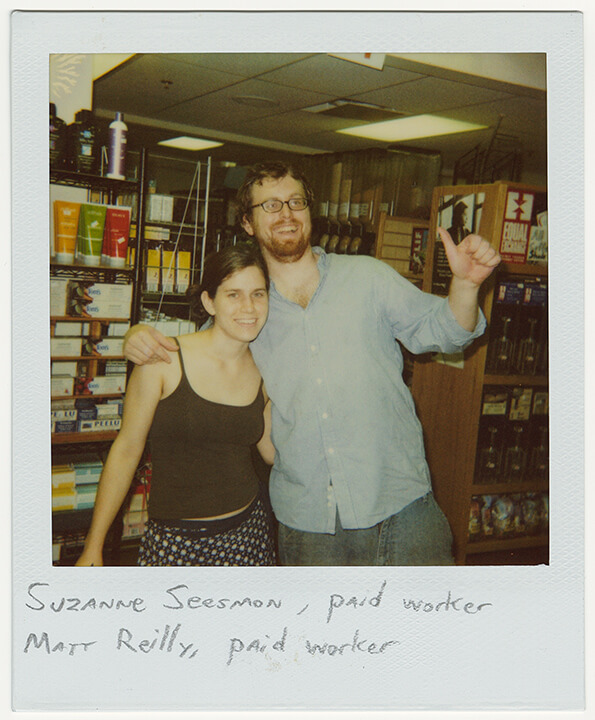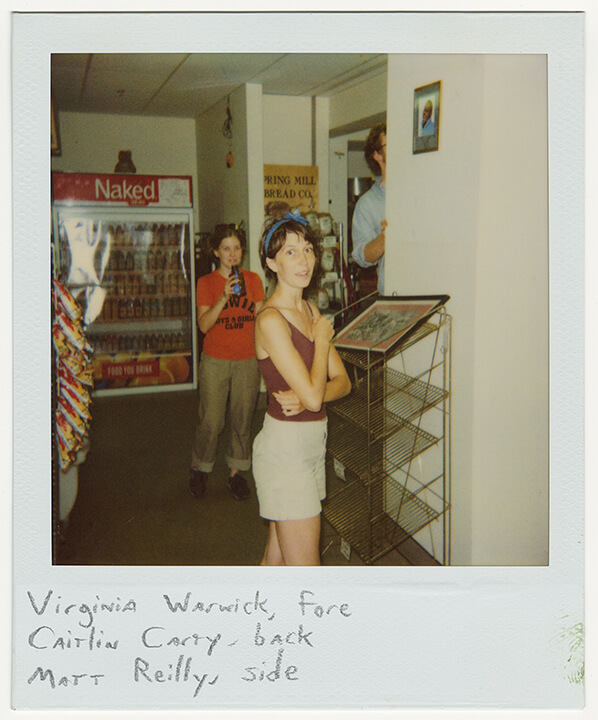- May 14, 2019
- By Sala Levin ’10
After more than 40 years of offering items like vegan chicken salad and bean spread on their signature sandwiches (alongside a helping of pro-worker politics), the Maryland Food Collective is slated to close at the end of the month.
On Friday, employees past and present gathered on the lower level of the Stamp Student Union with fans of the Collective, also known as the Co-op, to honor its history with an exhibit, a panel discussion and live music.
“The need that this place meets is the community itself,” said Mike Brennan ’19, one of the Co-op’s worker-owners, paid employees who share in the responsibilities of operating the business. “Having that gathering space where there’s a free flow of ideas, a free flow of conversation—it’s just a different mindset when you walk in.”
The Co-op has its roots in a grassroots sandwich line that sold 1970s-style healthy lunches (bean sprouts flourished) in the Stamp Student Union. After petitioning for a larger space, the Co-op was officially founded in 1975, with funding from the Student Government Association and the tagline “Food for people, not for profit.”
The no-frills store in the basement of the Stamp—with its bright lighting, well-worn couches and shelves of nutrient-heavy snacks—was one of the few on-campus destinations where vegetarian and health-conscious students could find a wide selection of options. Now that vegan, gluten-free and organic foods have gone mainstream, Brennan said, the Co-op’s niche has gotten more crowded, making it difficult for the Co-op to meet its operating costs.
Students have been working with Stamp leadership, Dining Services and the nonprofit Baltimore Roundtable for Economic Democracy to try to keep the co-op open, but have not found a solution. They have scheduled a meeting Wednesday morning with Vice President for Student Affairs Linda Clement as well as a Reading Day Rally in support of the Co-op.
“We are very grateful for the food co-op’s contributions to providing quality food service and community-building in Stamp and across campus over the past four decades," said Marsha Guenzler-Stevens, director of the Stamp.
Camila Tapia-Guilliams ’19, a former worker-owner who’s continued to be involved with the co-op, organized an exhibit for Friday’s celebration highlighting three aspects of the collective: philosophy, history and activism, such as 1980s-era demonstrations against nuclear arms, and support of anti-rape and nonviolent causes. Documents and photographs housed in Hornbake Library showed the co-op’s origins as an “anti-profit student-run, student-owned food co-operative,” as it was put in the Jan. 27, 1976, issue of The Diamondback.
 (It’s not the first exhibit to take note of the Co-op: The National Museum of American History’s ongoing “Food: Transforming the American Table 1950–2000” features a 1986 poster advertising the collective’s 10th anniversary party.)
(It’s not the first exhibit to take note of the Co-op: The National Museum of American History’s ongoing “Food: Transforming the American Table 1950–2000” features a 1986 poster advertising the collective’s 10th anniversary party.)
Photographs of long-haired worker-owners decked out in ’70s attire showed the Co-op’s genesis, while a range of letters from worker-owners and customers highlighted the ways various opinions were addressed. One former staffer’s plea: Quit it with the soy products—not healthy enough.
Tapia-Guilliams hoped the exhibit conveyed that “there doesn’t always have to be a traditional structure within a company for it to work … the fact that we’ve been going for so long shows that, although we’ve been struggling now and at different points, there is viability in a cooperative model.”
She also hoped that future students will learn of the Co-op’s legacy, noting that it thrived on not just ideology but day-to-day activism as well, offering, for example, food-insecure students the opportunity to work in order to earn enough credit for a meal. “I hope that people realize the history of this place and how it’s been such a positive impact on so many generations of students,” she said.
Topics
Campus & CommunityTags
Food